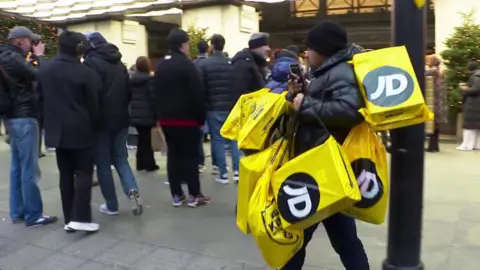Shoppers stay away from High Street, data shows
 Evan/BBC
Evan/BBCPreliminary footfall data shows Boxing Day shoppers are staying away from high streets and shopping centers compared with last year.
Data collected by MRI Software showed that as of 12:00 GMT, morning footfall on Britain’s main streets was down 10.2% from 2023, while footfall in shopping centers was down 13.9%.
The provisional figures are an early sign that online shopping continues to dominate traditional Boxing Day sales.
While trading is expected to remain brisk in many stores on Thursday, major retailers such as John Lewis, M&S and Next have chosen not to open most of their stores, saying they want to give staff a break over the festive period.
Lorna was one of those out shopping on Boxing Day, looking for deals with her mother and sister in Liverpool.
She told BBC News that this year was the first time she decided to set off later, arriving in the Liverpool shopping district at 10.30am.
“My mum and I come here every Boxing Day. Usually we get up at 5am and queue up. We’ve been coming here every year for the past 10 or 15 years, but this is the first time we’ve been late,” she said.

Another shopper from Liverpool, Dave, joked that while he doesn’t normally go out shopping on Boxing Day, he and his wife made a deal.
“I would go shopping with her and she would go to Liverpool games with me,” he said.
Data so far shows in-store traffic is nearly 36% below pre-pandemic levels.
As of 12:00, overall Boxing Day activity levels across all UK retail destinations were down 9.4% compared to 26 December last year.
Analysts told BBC News that profits at bricks-and-mortar stores are falling because of rising energy costs and overtime charges for bank holiday staff making them expensive to run.
Online stores have lower operating costs and less general overhead.
MRI Software’s Jenni Matthews said traffic is expected to increase year-over-year from December 27.
She said that despite the early data, she expected many shoppers to be “waking up from their post-Christmas slumber and looking to replenish their groceries and see what specials are available on Boxing Day”.
UK retail parks, which typically offer free parking and are more suitable for larger stores, fared slightly better, with visits down just 6.8% compared to last year.
In many ways, Boxing Day itself is no longer the major shopping event it once was.
Many retailers begin online sales on Christmas Eve, and brands are running sales throughout the year, including around Black Friday in November.
Meanwhile, the cost of living continues to squeeze household budgets.
Sales at clothing stores recently fell to their lowest level since January 2022, according to ONS data.
Rendle Intelligence and Insights analyst Diane Wehrle said among those choosing to visit attractions on Boxing Day, the focus had shifted to spending on things to do rather than things to buy.
Shopping habits have been changing for more than a decade as more consumers choose to shop online, she added.
Barclays, which accounts for nearly 40% of the country’s credit and debit card transactions, said it expected Britons to spend a total of £4.6 billion on Boxing Day, compared with £4.7 billion in 2023.
The bank said it expected the majority of spending to take place online – similar to 2023, when 63.9% of Boxing Day retail sales were made online, according to the bank.



